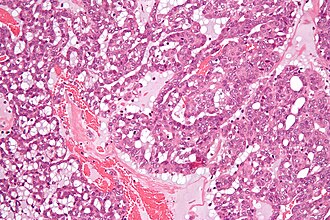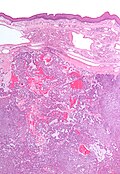Difference between revisions of "Polymorphous adenocarcinoma"
Jump to navigation
Jump to search
(more) |
(more) |
||
| Line 1: | Line 1: | ||
''' | {{ Infobox diagnosis | ||
| Name = {{PAGENAME}} | |||
| Image = Polymorphous_low-grade_adenocarcinoma_high_mag.jpg | |||
| Width = | |||
| Caption = PLGA. [[H&E stain]]. | |||
| Micro = low-grade cytology - nuclei ovoid & small, small nucleoli, powdery chromatin ([[papillary thyroid carcinoma]]-like appearance); eosinophilic cytoplasm; variable architecture - often small nests, classically has whorling ("eye-of-storm") pattern and single file pattern | |||
| Subtypes = | |||
| LMDDx = [[adenoid cystic carcinoma]], [[pleomorphic adenoma]], cribriform adenocarcinoma of the minor salivary gland | |||
| Stains = | |||
| IHC = | |||
| EM = | |||
| Molecular = | |||
| IF = | |||
| Gross = | |||
| Grossing = | |||
| Site = [[oral cavity]], [[salivary gland]] | |||
| Assdx = | |||
| Syndromes = | |||
| Clinicalhx = | |||
| Signs = | |||
| Symptoms = | |||
| Prevalence = rare | |||
| Bloodwork = | |||
| Rads = | |||
| Endoscopy = | |||
| Prognosis = | |||
| Other = | |||
| ClinDDx = | |||
}} | |||
'''Polymorphous low-grade adenocarcinoma''', abbreviated '''PLGA''', is a rare malignant [[salivary gland]] tumour. | |||
==General== | ==General== | ||
Revision as of 16:37, 23 November 2013
| Polymorphous adenocarcinoma | |
|---|---|
| Diagnosis in short | |
 PLGA. H&E stain. | |
|
| |
| LM | low-grade cytology - nuclei ovoid & small, small nucleoli, powdery chromatin (papillary thyroid carcinoma-like appearance); eosinophilic cytoplasm; variable architecture - often small nests, classically has whorling ("eye-of-storm") pattern and single file pattern |
| LM DDx | adenoid cystic carcinoma, pleomorphic adenoma, cribriform adenocarcinoma of the minor salivary gland |
| Site | oral cavity, salivary gland |
|
| |
| Prevalence | rare |
Polymorphous low-grade adenocarcinoma, abbreviated PLGA, is a rare malignant salivary gland tumour.
General
- Almost exclusively in the oral cavity.
- Classically found in the palate -- 60% of PLGAs in palate.
- Tumour of the minor salivary glands.
- Always a low-grade tumour - by definition.
- Female:male ~= 2:1.
- Older people ~50-70 years old.
Microscopic
Features:[1]
- Architecture: often small nests, may be targetoid.
- Classically has whorling with eye-of-storm & single file.
- Cytologically monotonous (uniform) with variable architecture - key feature.
- Nucleus: ovoid & small, small nucleoli, powdery chromatin.
- Papillary thyroid carcinoma-like appearance.
- Cytoplasm: eosinophilic.
- Nucleus: ovoid & small, small nucleoli, powdery chromatin.
- Indistinct cell borders.
DDx:
- Adenoid cystic carcinoma.
- Pleomorphic adenoma.
- Cribriform adenocarcinoma of the minor salivary gland.[2]
Images
IHC
- S100 +ve, CK +ve, vimentin +ve.
- GFAP +ve/-ve.
- BCL2 +ve/-ve.
- Generally negative for myoepithelial markers (calponin, actin) - useful if negative.
See also
References
- ↑ Humphrey, Peter A; Dehner, Louis P; Pfeifer, John D (2008). The Washington Manual of Surgical Pathology (1st ed.). Lippincott Williams & Wilkins. pp. 74. ISBN 978-0781765275.
- ↑ Skalova, A.; Sima, R.; Kaspirkova-Nemcova, J.; Simpson, RH.; Elmberger, G.; Leivo, I.; Di Palma, S.; Jirasek, T. et al. (Aug 2011). "Cribriform adenocarcinoma of minor salivary gland origin principally affecting the tongue: characterization of new entity.". Am J Surg Pathol 35 (8): 1168-76. doi:10.1097/PAS.0b013e31821e1f54. PMID 21716087.

